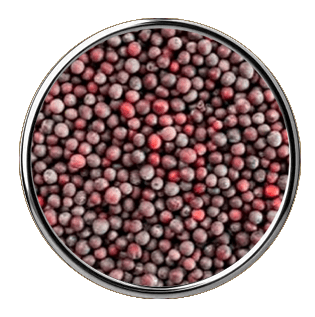Mustard Seeds are small, round seeds derived from various mustard plants, primarily black, yellow (white), and brown mustard.
Known for their pungent aroma, sharp flavor, and rich oil content, they are widely used in culinary, medicinal, and industrial applications. Mustard seeds are an essential part of global cuisine and are also processed to produce mustard oil, mustard paste, and animal feed cake.

High Oil Content : Contains 30–35% oil, commonly used in cooking
Spicy, Pungent Flavor : Intensifies when crushed or cooked
Multiple Varieties : Black (intense flavor), Brown (medium-hot), Yellow (mild and sweet)
Nutritional Value : Rich in omega-3 fatty acids, calcium, iron, selenium, and antioxidants
Culinary Uses : Tempering, pickles, spice blends, sauces, and salad dressings and ground into mustard powder or made into prepared mustard condiments
Oil Extraction : Mustard oil is widely used in Indian, Bangladeshi, and Nepali cuisine and also used for massage and Ayurvedic purposes
Pharmaceuticals & Traditional Medicine : Used in balms, plasters, and oils for its warming and anti-inflammatory propertiesr
Animal Feed & Fertilizer : Mustard seed cake, the residue after oil extraction, is a high-protein cattle feed and also used as organic manure
| Parameters | Value |
|---|---|
| Purity | 99% – 99.95% |
| Moisture | Max 6% – 8% |
| Oil Content | 30% – 35% |
| Admixture | Max 1% |
| Color | Yellow / Brown / Black (as per grade) |
| Form | Whole seed |